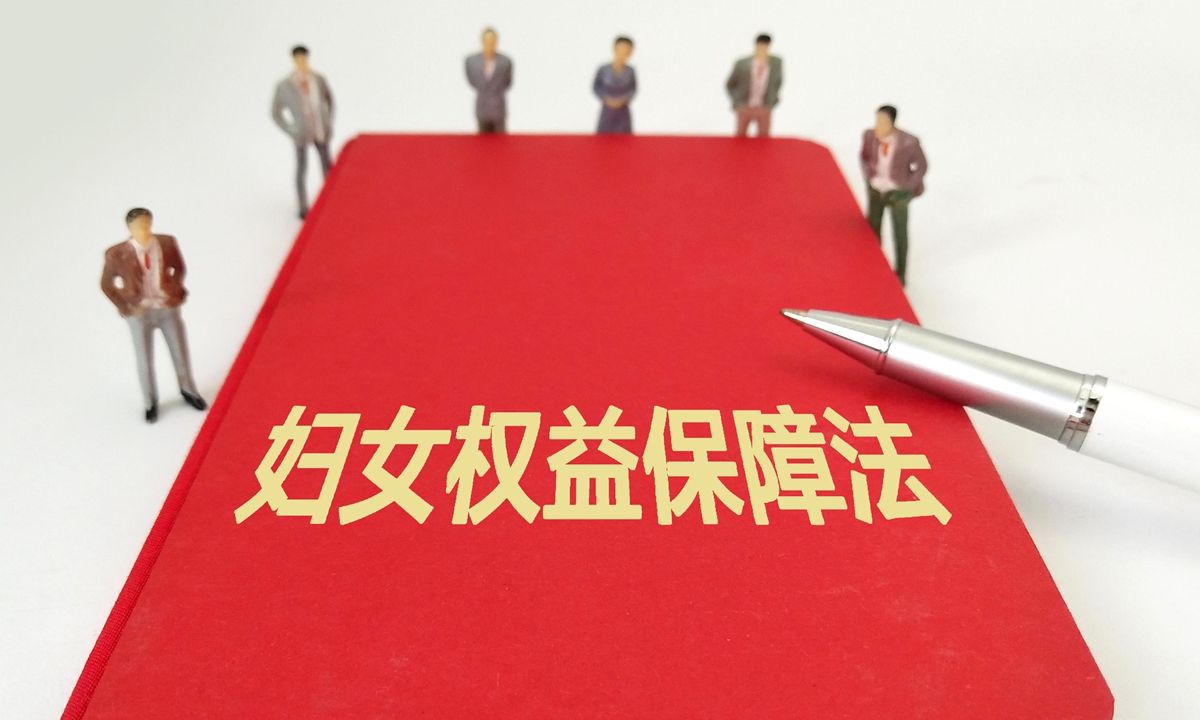IN-DEPTH / IN-DEPTH
Western media, anti-China forces use MeToo movement to incite gender antagonism: expert

Photo: VCG
A recent controversial interpretation of English words by a prominent Chinese university has sparked heated debate on social media and brought current gender antagonism on the Chinese internet into the spotlight.
The controversy started when the official Sina Weibo account of Central China Normal University released a poll asking people what "confidence man" meant with four options: puxinnan, which means ordinary but confident men; liar; egomaniac; and domineering boss, of which the term puxinnan was coined by a famous female stand-up comedian, Yang Li, in a show, saying "Chinese men are obviously so ordinary, but so confident."
Many netizens believe that although the actions of the account operator may have been inadvertent, the controversy also shows that more young Chinese people are being subtly influenced by topics that provoke confrontation between genders, and that even many students who receive a higher level of education are entangled in the "gender war."
In recent years, there have been increasingly sharp voices on the internet discussing gender topics, and it seems that whenever a controversial social event occurs, there will always be heated discussions on the internet with some voices who tend to attribute the result to gender roles and norms. Many netizens have thus developed gender biases, and have especially fallen under the illusion that Chinese women have long been oppressed, following the trend calling for the rise of "suppressed feminist fighters."
Who exactly is stirring up gender antagonism in China in this protracted and intensifying online scolding war? What have they actually done under the banner of promoting gender equality? Is the situation of Chinese women's lives really as precarious?
Spooky 'feminism'
The so-called #MeToo movement, which has been introduced from the US in recent years, has become a slogan for many "Chinese feminists." However, there's growing evidence that some Western media outlets and anti-China forces have taken advantage of it as a tool to incite gender antagonism and even divide and subvert rule of law in China. Behind these anti-China groups or figures, the US government can often be found silently offering support.
The recent firing of a female employee by Chinese e-commerce giant Alibaba who had accused her manager of sexual assault has once again set the internet ablaze.
In August, a female Alibaba employee surnamed Zhou released an open letter accusing her superior and a client of molestation and sexual assault on a business trip. However, the police eventually announced that no evidence of a rape was found. The relatives of the alleged suspects, then in police custody, also repeatedly spoke out online, questioning the details provided by Zhou regarding her allegations. Media reported that the employee had been fired for spreading false information.
Faced with an extremely convoluted social case, many Western media outlets focused only on the words that made their blood boil, distorting the focus of the story with a clearly biased mentality in their reporting.
Bloomberg, for example, gave the latest development an alarming headline: "Alibaba Fires Woman Who Accused Boss of Rape in #MeToo Setback," and the BBC ran an article entitled "Alibaba fires woman who claimed sexual assault." Only a few Western news outlets pointed out basic journalistic fact while explaining the reason for dismissal given by the company in their headline.
Another recent event that has been wildly hyped as a landmark in China's #MeToo Movement by Western media is related to Zhu Jun, one of the most recognizable faces on Chinese television, and Zhou Xiaoxuan (also known by her online name Xianzi), an intern who once worked on Zhu's show. In the latest update in September since the case was exposed to the public three years ago, the People's Court of Haidian District in Beijing rejected Xianzi's claims of being sexually harassed by the anchor.
Unsurprisingly, this result was also twisted by the Western mainstream media following the same pattern, with sensational reporting on what they perceived to be the focus of events.
Observers have pointed out that confirming a rape case, beyond mere accusations, requires hard evidence. However, some so-called feminists have chosen to convey their own narrow-minded, ill-intentioned views to the public for their own interest, as has the biased Western media.
These events are undoubtedly part of #MeToo... It is inconceivable that something like this would have transpired without #MeToo, said Lü Pin, a so-called feminist activist who lives in the US but claimed to be "deeply involved in the movement in China," while giving an evasive interview to the Associated Press.
Lü is the founder of Feminist Voice, one of the most influential feminist accounts on Sina Weibo blocked by the platform in 2018 for posting a number of overly aggressive statements such as "Chinese men are not worthy of Chinese women."
Lü has a very clear political stance against China and the Communist Party of China (CPC). In the US, Lü has been active in various Western media campaigns and forums, playing the role of victim under the Chinese government's alleged repression, and has collaborated with many anti-China activists under the banner of women's rights to slander China on issues such as Hong Kong and Xinjiang.
When asked in an interview how to evaluate the Chinese government's passing of banning discrimination against women in the workplace in 2019, she still stubbornly claimed that the "[Chinese] government will never make beneficial changes."
Gender Watch, another women's rights site that Lü was in charge of, was reportedly funded by the US-based Ford Foundation, which was thought to be inextricably linked to the US government, even considered "a front for the American external spying agency CIA," the media reported. In 2016, the closure of a Women's Legal Aid center funded by the Ford Foundation in Beijing even received expressions of concern from then US presidential candidate Hillary Clinton.
Meanwhile, California-based China Digital Times, a so-called news site that claims to document the internet and users' "revolts" in the Chinese mainland, has repeatedly encouraged netizens to confront each other on perceived gender issues, most recently being a discussion about singer Wang Leehom's marriage scandal, and it used the headline, "Women must take back the social and economic advantages that should be theirs."
The Global Times found that the National Endowment for Democracy (NED), a veteran anti-China foundation financed by the US government, has given a total of $1,585,700 as "award amounts" to China Digital Times since 2016.
And since 2016, NED has continually invested large amounts of money in the Chinese mainland "to advocate for and raise international awareness of women's rights in China" and "influence the Chinese Women's Rights Movement," with a total $90,166 spent on the project in 2020.
Observers have pointed out that the NED has funded many so-called "feminist organizations" in China, which are not dedicated to women's rights, but use various social media platforms to post extreme rumors such as, "China is the most violent country in terms of male power," promoting Western affirmative action movements, and inciting hatred of the basic family unit, marriage, society, government, and the political system.
In April, a video of a Xinjiang-related interview in 2015 with former FBI translator Sibel Edmonds surfaced, in which she revealed the US' conspiracies, playing the gender and race cards, while claiming that the Chinese were gunning down and torturing Uygur ethnic groups in Xinjiang. "But as a Western nation... We never cared about people," she confessed.
"The current increasingly acute gender antagonism in China is the result of a targeted and systematic effort by such a group of people to instigate a 'color revolution' in China," Shen Yi, a professor from the School of International Relations and Public Affairs at Fudan University, told the Global Times.
Those with evil intentions even disguise themselves as witness, using the empathy of ordinary people to create conflict, while also trying to use this anger and misunderstanding between people to disintegrate our country's credibility and cultural tradition, said Zhu Wei, a communications researcher at the China University of Political Science and Law in Beijing.

China's draft version of the Law on the Protection of Women's Rights and Interests Photo: IC
Traffic password
The continued influence of so-called feminist thinking under the Western discourse, as it turns out, has also been exploited by some within China to gain profit and attention for themselves,.
In recent years, as gender issues have continued to become a key social issue, many social media opinion leaders have earned tremendous wealth by expressing extreme or inflammatory views on related topics.
After Yang became popular for her invention of the term Puxinnan, many opinion leaders began experimenting with "gender antagonism", despite government improving regulatory measures in recent years, Zhu Wei said.
Many of the so-called opinion leaders who hype the concept of "gender antagonism" are motivated by personal business interest and internet traffic, which further affects discourse on the topic online, Shen told the Global Times.
"When many people are held hostage and become the opinion leader's followers, they also become bargaining chips with potential sponsors. The opinion leader can thus conduct commercial promotions, which become the opinion leader's business."
Most of the "opinion leaders" who advocate gender antagonism on the internet do not care about women's rights or their well-being, but only see it as profitable venture or business, Shen said.
Observers also point out that the undereducated young people have become prime targets for these so-called opinion leaders, which in turn creates gender-oppositional ideas that continue to proliferate on the internet.
This current spreading gender-antagonism mindset will eventually be captured and exploited in the name of capitalism and may be massively commercialized and directed toward businesses such as personal adult products and even illegal surrogacy outside the country, Shen said.
When such views create a greater divide among the general public, it makes the term feminism highly tainted.
Analysts point out that in the rapid development of the internet, the world has seen a similar trend: In the face of a significant social event, netizens tend to intuitively interpret it and argue over it by taking side, eventually irrational discussions lead to vicious confrontation and quarrels.
At this point, all those involved in the discussion are more likely to be used, said Zhu Wei. And over time, the space for rational discussion is gradually eroded.
As a result, individuals and groups genuinely committed to the affirmative action movement and to the well-being of women, encounter significant resistance in doing their work.
"The affected public tends to fall into a relatively simple logic of calling each other names and venting their frustrations, but few people care about the real solution," Luo Ruixue, an expert on feminism and gender equality in Guangzhou, South China's Guangdong Province told the Global Times.
Real gender equality work demands practitioners to communicate with various departments in order to make contributions to the status quo, but such hard and practical work remains unnoticed in the current context and does not enter public discourse, Luo said. "The situation is regrettable."
Rational expectations
In October, a blogger exposed a post on China's Quora-like platform Zhihu by a suspected pro-"Taiwan independence" netizen, which encouraged Chinese people to protest at a subway station over an incident in September in which a female passenger was forcibly dragged out of the carriage by security staff at a Xi'an subway station in Northwest China's Shaanxi Province.
The netizen suggested that women blocked the subway doors with a human wall to force the subway to stop running, and then invited the BBC to cover it, even claiming if there were enough protesters there would be no convictions. "If you don't understand the concept of gender identity and political dichotomy, it's best to stay out of the discussion on gender issues," the blogger warned.
At present, more and more Chinese netizens are beginning to realize the seriousness of the problem of "gender wars" on the internet, and are also gradually becoming aware of the tactics used by many people who stir up confrontations.
On China's major social networking platforms, there are many vloggers who have produced special videos analyzing the possible culprits of these phenomena and what bad impact they will cause, which have been warmly received.
In many cases, such severe gender tensions exist only on the internet. In reality, most Chinese people still respect each other, one netizens commented.
"The topic of gender in China has a long history of evolution, especially after the establishment of the CPC when China began to develop its own set of methods and ideas to address gender equality issues, Shen said. "In the socialist construction stage, the proportion of women in leadership and governing positions at all levels is guaranteed, and women's rights and interests are integrated into the entire national welfare system," he noted.
Luo said that she has been witnessing the Chinese government making more and more policy plans to protect women's and children's rights, and the government has given sufficient space for women's rights organizations to operate in accordance with the law.
In the latest move, China's draft amendment to the Law on the Protection of Women's Rights and Interests was submitted for consideration on December 20. The draft contains a number of provisions that truly drill down to the nitty-gritty of protecting women's rights, such as banning the harm of women through superstitious acts, mind control, or trickery by pick-up arts, and guarantees more female than male toilet seats.
This is the first major revision of the Law after nearly 30 years of operation, and has been praised by observers as a landmark move.
"At present, various laws and regulations in China are becoming more and more refined. In implementing gender equality and protecting vulnerable groups, we need to act more based on our national conditions and traditions to build a more rational and inclusive environment, while not allowing unscrupulous people to have the opportunity to make trouble," Zhu Wei said.

